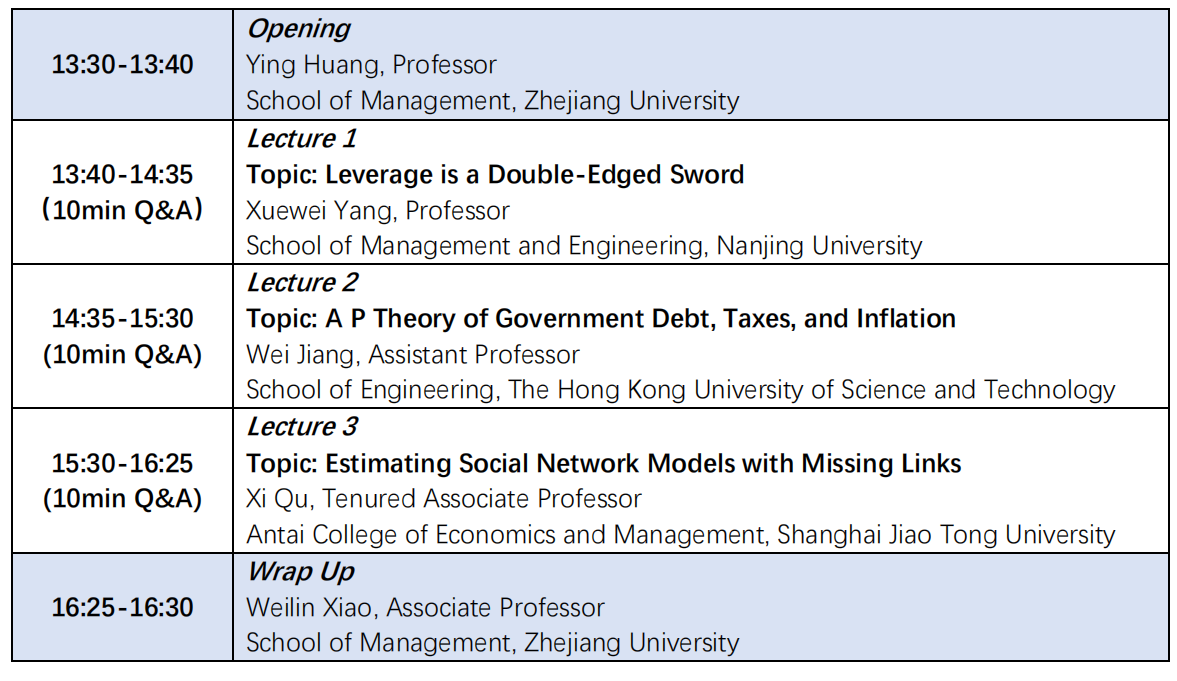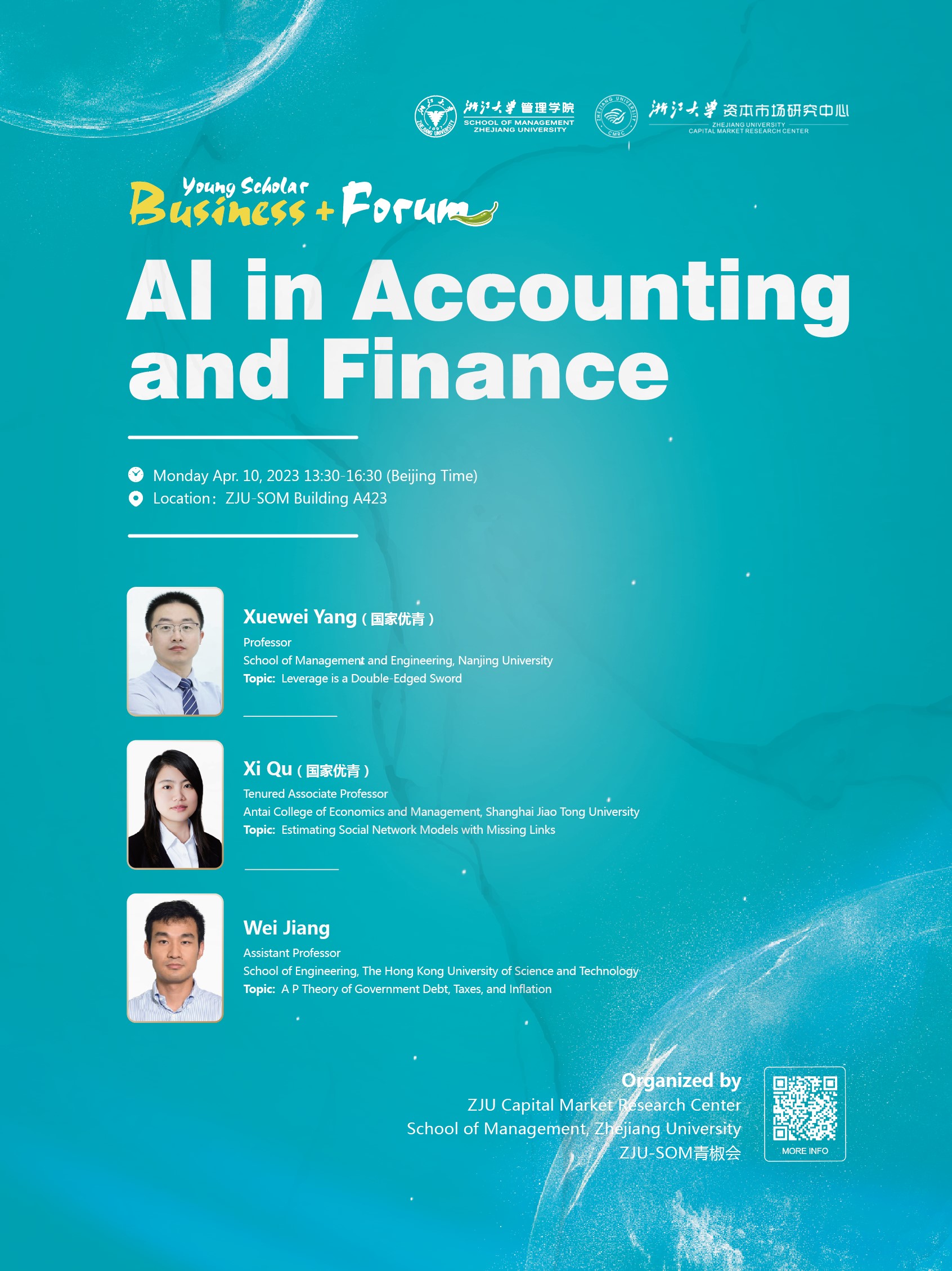讲座主题:人工智能在会计和金融中的应用 AI in Accounting and Finance
主讲嘉宾:南京大学 工程管理学院 杨学伟教授
香港科技大学 工程学院 蒋为副教授
上海交通大学 安泰经管学院 瞿茜副教授
讲座时间:4月10日(周一)13:30-16:30
讲座形式:管理学院新大楼A423
会议日程安排:

会议信息:

Xuewei Yang
School of Management and Engineering, Nanjing University
Dr. Xuewei (Aaron) Yang is a Professor of Finance at the School of Management and Engineering, Nanjing University. He was approved for the National Natural Science Foundation Outstanding Youth Science Fund Project. He received a B.Sc. in mathematics from Xidian University in 2006 and a Ph.D. in probability and statistics from Nankai University in 2011. From January 2012 through January 2013, he was a postdoc fellow in finance at the City University of Hong Kong. He is mainly interested in theoretical and empirical asset pricing, investor behavior and financial innovation. He has published papers on Journal of Financial Economics, Review of Financial Studies, INFORMS Journal on Computing, Mathematical Finance, etc.
Topic: Leverage is a Double-Edged Sword
Abstract:
We use proprietary data on intraday transactions at a futures brokerage to analyze how implied leverage influences trading performance. Across all investors, leverage is negatively related to performance, due in part to increased trading costs and in part to forced liquidations resulting from margin calls. Defining skill out of sample, we find that unskilled investors’ leverage amplifies losses from lottery preferences and the disposition effect. Further, leverage stimulates de facto liquidity provision by skilled investors, and enhances their returns. Although regulatory increases in required margins decrease skilled investors’ returns, they enhance overall returns, and attenuate return volatility.

Wei Jiang
School of Engineering, The Hong Kong University of Science and Technology
Dr. Wei Jiang joined the Department of Industrial Engineering and Decision Analytics at the Hong Kong University of Science and Technology as an Assistant Professor in August 2019. He received Ph.D. in Quantitative Finance from National University of Singapore (2018), and both M.S. in Financial Mathematics (2012) and B.S. in Mathematics (2009) from Peking University. Prior to his Ph.D. study, he worked as a Financial Analyst in China Merchants Finance Holding Co., Ltd. He has published papers on Journal of Finance, Management Science, Mathematical Finance, etc.
Topic: A P Theory of Government Debt, Taxes, and Inflation
Abstract:
An optimal tax, inflation, and government borrowing plan in a setting with tax distortions (Barro, 1979) locally pin down the marginal cost of servicing government debt, called marginal p. An option to default determines the government’s debt capacity and its optimal state-contingent risk management policies make its debt risk-free. Optimal debt-GDP ratio dynamics are driven not only by three widely discussed forces, 1.) a primary deficit, 2.) interest payments, and 3.) GDP growth, but also by 4.) hedging costs and 5.) seigniorage considerations. Hedging fundamentally alters debt transition dynamics and equilibrium debt-capacity, which are at the center of the recent ‘r−g’ and debt sustainability discussions. We calibrate our model and make comparative dynamic quantitative statements about the debt-GDP ratio transition dynamics, equilibrium debt capacity, and how long it will take the US to attain debt capacity.

Xi Qu
Antai College of Economics and Management, Shanghai Jiao Tong University
Dr. Xi Qu is a Tenured Associate Professor at Antai College of Economics and Management, Shanghai Jiao Tong University. She was approved for the National Natural Science Foundation Outstanding Youth Science Fund Project. She received B.A. in Economics from Peking University in 2006, an M.A. in Economics from Peking University in 2008, and a Ph.D. in Economic from the Ohio State University in 2013. Her research interests include econometrics theory, regional & urban economics, and social network & peer effects. She has published papers on Journal of Political Economy, Journal of Econometrics, Quantitative Economics, Econometric Theory, Journal of Business and Economic Statistics, etc.
Topic: Estimating Social Network Models with Missing Links
Abstract:
We propose an adjusted 2SLS estimator for social network models when existing network links are missing from the sample at random (due, e.g., to recall errors by survey respondents, or lapses in data input). In the feasible structural form, missing links make all covariates endogenous and add a new source of correlation between the errors and endogenous peer outcomes (in addition to simultaneity), thus invalidating conventional estimators used in the literature. We resolve these issues by rescaling peer outcomes with estimates of missing rates and constructing instruments that exploit properties of the noisy network measures. We apply our method to study peer effects in household decisions to participate in a microfinance program in Indian villages. We find that ignoring missing links and applying conventional instruments would result in a sizeable upward bias in peer effect estimates.




